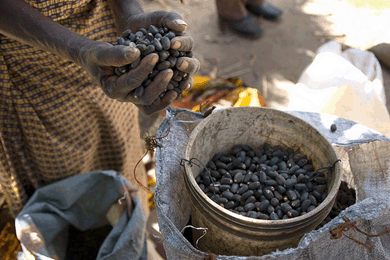
|
Published: 28 May 2012
Food shortage risk from biofuel targets
Parts of the developing world, particularly India and countries in Sub-Saharan Africa, will suffer food shortages if their planned biofuels targets are implemented by 2020, a study has warned.

|
|
A farmer from northern Zambia shows off her first crop of jatropha seeds, a biofuel crop from the jatropha tree. The area under jatropha is expanding in Zambia. Credit:
CIFOR
|
The study, published in a recent issue of the journal Agricultural Economics , looks at 25 countries and geographical regions, including Latin American and the Caribbean, Sub-Saharan Africa and the United States. It found that the targets will also affect national wealth.
‘Our results suggest that the impacts would be significant in developing countries like India and Sub-Saharan Africa,’ the authors write.
The authors found that an expansion of biofuel production to meet existing or higher targets would slightly reduce GDP [gross domestic product] at the global level but with mixed effects across countries or regions.
More than 40 countries have made commitments to meet at least ten per cent of their transportation fuel needs with biofuel by 2020.
Using a simulation model for different economic factors, including type of feedstock, the researchers found that the expansion of biofuels would cause a moderate decrease in world food supply, and more significant decreases in certain developing countries.
Lead author Govinda R. Timilsina, a senior economist with the World Bank, told the science news provider SciDev.Net that ‘Countries that do not produce enough biofuel feedstock but have ambitious biofuel targets — such as India's 17 per cent mandate — would not benefit, because they would have to import most of the feedstock.’
Mr Timilsina added that unless unused fertile lands in developing countries are used, more farmers may convert food cropland into biofuel feedstock, which could lead to a decrease in food supply and high food prices.
But José Goldemberg of the Institute of Electrotechnic and Energy at the University of São Paulo, Brazil, told SciDev.Net that the study's findings are ‘technically controversial’, given the substantial evidence that the hike in food prices in 2008 was mainly due to the increase in cost of crude oil.
‘In São Paulo, there has been increase in sugarcane production in the last ten years for generating ethanol, but food production has not decreased,’ he said, adding that biofuel production is unlikely to cause decreased food supply in countries in Africa and Latin America.
Thomson Sinkala, chairman of the Biofuels Association of Zambia, says that the link between biofuels and food is country-specific. In many African countries, he notes, feedstock for biofuel production costs less than its equivalent for food.
‘It is unlikely that a food crop based-feedstock producer would want to sell their produce at 40 per cent below what they can fetch in the food market,’ says Mr Sinkala.
Source: adapted from the SciDev.Net story ‘Biofuels goals may lead to food shortages’, by Bernard Appiah, published 12 May 2012. Content from SciDev.Net licensed under a Creative Commons Attribution Licence.



